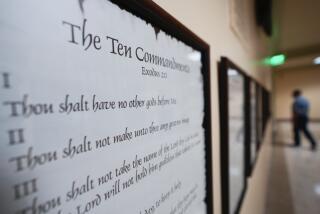An occasional transgressor points out that the English language has a friend in high places
- Share via
Those of us who were not jubilant over the appointment of William Rehnquist as chief justice of the United States may find reason not to despair in an observation from my esteemed colleague, Gladwin Hill.
“Success!” he writes. “We can come out in the open now. Up to now our Alliance Against Vulgarization of English has had to operate underground, because we were up against too much opposition. But now we’ve arrived. One of our people now sits as chief justice of the United States.”
Hill notes that a story in The Times reported that on only his second day in the chair, Rehnquist chastised a lawyer for using the word irregardless.
The chief justice sternly admonished the hapless fellow: “I feel bound to inform you that there is no word irregardless in the English language. The word is regardless .”
Hill says: “This is the first coup in a major campaign. Next we’re going after people who write alright , there being no such word in the English language either; it’s an ignorant distortion from already , which is a word.”
Hill serves notice that AAVE also hopes to stamp out in regards to , noting that it should be in regard to or simply as regards (or regarding ).
“Then we’re going after the bumpkins who talk about “ ‘daylight savings time.’ (You have savings in the bank, but when you move the clock up, you’re saving daylight.)
“Other high-priority targets of the Alliance are people who insist on using media as a singular noun (it is, of course, the plural of medium ); people (including many in high places) who pervert nuclear into ‘new-kew-lar,’ and people who spell it ‘barbeque’ instead of ‘barbecue,’ apparently under the misapprehension that it’s a derivation from the French. There is no such word in French, and if there was it would have to be pronounced ‘barbeck.’
“Those are formidable agenda (plural of agendum ). But with the Supreme Court on our side, how can we fail?”
Perhaps the new chief justice will be as vigilant in protecting the Constitution as he is the language. I wonder how he would rule on disinformation .
I hope Hill adds to his list of prohibitions the use of I could care less when the opposite is meant.
By the way, when he became secretary of commerce a few years ago Malcolm Baldrige launched a crusade for plain English in his department, and computerized it. If anyone tried to type words on the computer’s hit list, like targeted or effectuate , the computer would write XXXX instead. It would also X out redundancies like end result and serious crisis . It also encouraged brevity. No letter could be longer than one page. “Regardless of subject matter?” someone asked. Subject matter , he was told, was on the hit list.
These are encouraging trends. However, I doubt that even the chief justice can do much to stem the tide of gobbledygook. It is too useful in obfuscating the facts and disinforming the public.
Speaking of gobbledygook, Barbara Toohey of Van Nuys pleads for help in finding the meaning of bloviate . She says she has looked it up in all her dictionaries and called on her former colleagues at the Los Angeles Valley College Library, in vain.
She says, “I believe it means something like what they do in Congress and in corporate meetings--emit a lot of grandiose talk that doesn’t get anywhere.”
She is absolutely right, and the word is right there in Webster’s Third New International Dictionary. “ bloviate , to orate verbosely and windily.”
Meanwhile, just to show you how elusive good English can be, I must confess one of my own sins. The other day, in recalling O. Henry’s poignant story, “The Gift of the Magi,” I said that the husband “covets his watch,” and the wife “covets her beautiful long hair.”
Several readers have written to point out that to covet means to desire something that does not belong to one; so the husband could not have coveted his watch, since it was his; and the wife could not have coveted her hair.
Lolla Toll of Thousand Oaks and others point out that the word should be treasured , not coveted .
“I am less surprised than shocked,” writes Alton Safford of Wrightwood.
I plead nolo contendere , just like those big-shot gangsters and crooked businessmen who are guilty.
I have no idea why I wrote covets instead of treasures or cherishes . Certainly it was not ignorance of the word’s meaning. One may covet things that do not belong to someone else, such as awards, honors and invitations. But one cannot covet what already belongs to oneself.
Of course the word’s meaning of desiring something that belongs to someone else is ingrained in our consciences by the Ten Commandments: “Thou shalt not covet thy neighbor’s house; thou shalt not covet thy neighbor’s wife, nor his manservant, nor his maidservant, nor his ox, nor his ass, nor anything that is thy neighbor’s.”
I cannot say that I have been a good Christian. I’m afraid I have not kept all the Ten Commandments all my life. I do not feel obliged to confess which ones I have broken. I do believe, however, that I have not coveted my neighbor’s house, wife, manservant, maidservant, ox, ass, or anything else that was his. Oh, maybe his Alfa Romeo, or his Chris Craft.
But the 11th Commandment is “Thou shalt not use the wrong verb.”
And I have sinned.
More to Read
Sign up for Essential California
The most important California stories and recommendations in your inbox every morning.
You may occasionally receive promotional content from the Los Angeles Times.













